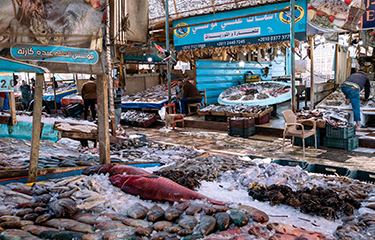An ongoing economic crisis in Egypt is shaking the country's seafood sector, as it faces historic currency devaluation, rising inflation levels, and foreign currency shortages.
The country's inflation rate spiked 8.5 percent in 2022 due to the global crisis triggered by the Russia-Ukraine conflict and to the devaluation of the Egyptian pound, which lost half of its value compared to pre-conflict, according to an analysis by Stanbic Bank. Egypt is heavily reliant on wheat exported from Ukraine and Russia, and that trade has been disrupted as a result of the war. The significant drop in imports of grains is a negative sign for the health of Egypt’s economy, as it was the world’s largest importer of wheat before China took that spot.
Egypt is facing a deepening economic crisis, with the Egyptian pound falling 50 percent compared to the U.S. dollar in 2022, and food price inflation has reaching 60 percent.
“Economic fallout from the war in Ukraine spiked international prices higher and generated a foreign currency crunch in Egypt, coupled with the Egyptian pound losing almost half of its value against the U.S. dollar since March 2022,” a U.S. Department of Agriculture (USDA) report said.
Egypt's aquaculture industry, a robust sector focused on tilapia, has been hit by higher grain prices. The country is the top aquaculture producer in Africa and the sixth-largest by volume worldwide, producing third-highest volume of tilapia globally. Egypt's government has set a target of increasing its fish production to more than 3 million MT by 2025. The country fast-tracked government plans to expand and improve the protection of several of its inland fisheries, particularly lakes, as part of a fisheries and aquaculture development scheme.
That plan is under duress, however, as the ...
Photo courtesy of Curioso.Photography/Shutterstock








